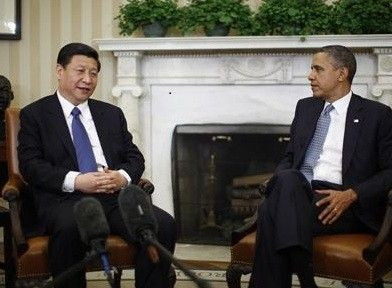Obama Tells Chinese VP Xi: 'Work by the Same Rules'

U.S. President Barack Obama pressed Chinese Vice President Jinping Xi on Tuesday over his country's huge trade surpluses, kicking off a five-day visit that could set the tone for U.S.-China relations over the next decade.
The Chinese VP, slated to become the next leader by 2013, touched down at Andrews Air Force base Tuesday morning to commence a sojourn that included meetings with Obama and other top administration officials at the White House.
Xi's White House visit was the centerpiece of a U.S. trip that may help the Chinese vice president boost his international standing and show he is capable of steering his country's crucial relationship with Washington for the next decade.
During their brief meeting, Obama sought to balance his desire to make a good start with Xi with the political need to look firm with Beijing in an election year when American voters' anti-China sentiment is running high.
We have tried to emphasize that because of China's ... extraordinary development over the last two decades, that with expanding power and prosperity also comes increased responsibilities, Obama said as he sat with Xi in the Oval Office.
We want to work with China to make sure that everybody is working by the same rules of the road when it comes to the world economic system, and that includes ensuring that there is a balanced trade flow between not only the United States and China, but around the world, he said.
Xi, who is in line to assume the presidency in March 2013, said he looked forward to building a cooperative partnership based on mutual respect and mutual interests. He did not address Obama's veiled criticisms of Beijing's policies.
Aside from Xi's future as China's leader, the visit has a symbolic significance, touching down almost 40 years to the day since President Richard Nixon flew to Beijing, altering the course of U.S.-China relations.
U.S. Vice President Joe Biden said just prior to the talks: We are not always going to see eye to eye. We are not always going to see things exactly the same, but we have very important economic and political concerns that warrant that we work together.
Obama and Xi smiled and nodded as each other spoke and shook hands during an appearance before reporters.
Xi's visit comes at a time when ties between the world's two biggest economies have been buffeted by strains over trade, currency, human rights and military intentions.
During the meeting around 200 anti-Beijing protesters marched and chanted slogans against China's crackdown in Tibet -- an issue that U.S. officials said would figure in the talks with Xi.
© Copyright IBTimes 2024. All rights reserved.





















